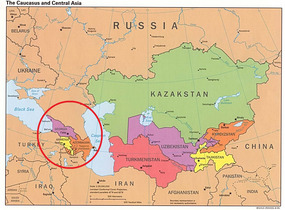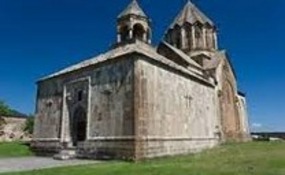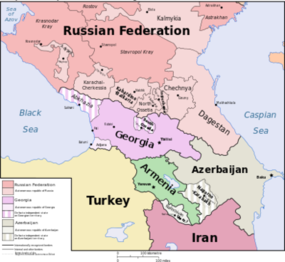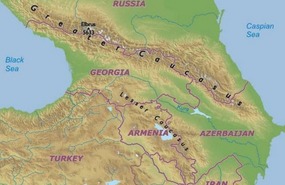A boy asks his grandfather why the Armenians have not sent a man into space. The old man replies "If the Armenians sent a cosmonaut into space, the Georgians would die of envy. If the Georgians die of envy, then the Armenians will die of pleasure. And if the Armenians and the Georgians die, then the Azeris will be left with all the land" (Old Armenian Joke)
From the minute we entered Armenia, and for the duration of our trip through Georgia and Azerbaijan, we were quite confounded by the volatility of the Caucasus region's political situation and the bizarre complexity of the relationships between each country and their powerful, neighbours of Russia, Turkey and Iran. Here is my take on what we learnt and understood from our fascinating two week journey by land across the Caucasus.
AN UNCOMFORTABLE DINNER PARTY
Just imagine hosting a dinner party for the Caucasus family.
To make it suitably family friendly, we would need to invite their immediate neighbours of Turkey, Iran and Russia and as well as of course the extended family member, the always influential (did we hear meddlesome?) United States. What a challenge - organising the dinner table would rival arranging the seating of a Japanese imperial banquet .... And that is really saying something. Sometimes it is difficult having friends in such high places....
Perhaps you would seat the two big powers Russia and the US at each end of the table. It would keep them diplomatically apart and they would like being heads of the table, provided they are facing doors of course.
And now comes the difficult part. You could seat Armenia perhaps near to, but no too close to Russia. Russia currently protects Armenian borders from its old foes the Turks but it is an uneasy relationship. Armenia must tread a delicate path between the two super powers, especially in light of the 2005 construction in Yerevan of the largest US embassy in the world. Since the early 1990's, the US has made a strong presense in Armenia, locating an embassy in the capital within months of the Soviet Union collapse. Perhaps it would be diplomatic for Armenia to raise a toast to the two super powers before the meal begins?
Given the intractable and still current genocide issue with Turkey's mass killings of Armenians during World War II, it would be pertinent to seat Turkey as far away from Armenia as possible. And similarly, with the more recent bloody war with Azerbaijan over the enclave of Nagorno- Karabakh and the still very current accusations of genocide from each side, it could be worthwhile seating friends Turkey and Azerbaijan opposite each other but again, nowhere near Armenia
You could sit poor Georgia between Armenia and Azerbaijan, but not anywhere near Russia - remember the more recent South Ossetia War? Georgia is tolerant of both Armenia and Azerbaijan. It should get on well with Armenia as both are Christian countries - but wait a minute, the Armenian version of Oriental Orthodox Christianity interprets the religion quite differently from the Georgian Eastern Orthodox church and so you would need to treat the conversation carefully and not discuss religion over dinner. And keep in mind also that Georgia is very wary of Armenia's close ties with Russia.
Surprisingly, relations between Georgia and Muslim Azerbaijan have been generally closer than those with Christian Armenia. Economic and political factors have contributed to this situation. Firstly, Georgian fuel needs make good relations with Azerbaijan vital to the health of the Georgian economy. Secondly, Georgians have sympathised with Azerbaijan's position in the conflict between Armenia and Azerbaijan over the ethnic Armenian enclave of Nagorno-Karabakh because of similarities to Georgia's internal problems with Abkhazia and South Ossetia.
And now - where we would sit Iran? You could reasonably assume that because Azerbaijan and Iran are both Muslim countries, they may get on splendidly together. However, there are significant tensions between Azerbaijan and Iran over the Azerbaijan's recognition of Azeri independence. And this is to say nothing of the Azeri ban on using the hijab in Azerbaijani high schools and a surprising increase in arms trade between Israel and Azerbaijan - as well as increasing relations with the US. Interestingly, Iran has established relatively good relations with the Christian countries of Georgia and Armenia.
Although the two countries are somewhat wary of each other, I would suggest that we sit Turkey and Iran together with Iran opposite Georgia and Armenia and Turkey opposite Azerbaijan - but on the Russian end of the table.
And our hosts Australia? Well, best not sit us too close to the Russian end of the table. After all, remember the recent dire Shirt Fronting warnings from our Prime Minister Tony Abbott to Russia's President Putin? Perhaps we could nudge up to the US end and talk about air strikes in Syria?
And so, it would be an interesting but mind spinningly exhausting evening. In the shadows of your powerful neighbours it could be a Most Uncomfortable Dinner Party.
Oh, I wonder if we should have invited China....?
BUT WHERE AND WHO ARE THE CAUCASUS?
To understand our dinner party dilemma, it is necessary to explore the geographical, political and historic background to the Caucasus - one of the most politically and ethnologically complex regions in the world.
When we first planned our trip to the Caucasus, we were frequently asked "But just where are the Caucasus?" Everyone was familiar with the name of the region but few had any exact idea of its location, nor the countries it comprises.
We agree, it's hard to get your head around the Caucasus, the strange mountainous isthmus sitting between the Black Sea to the west and the Caspian Sea to the east. To the north lies Russia and a number of neighbouring independent states under Russian jurisdiction (including Dagestan, Chechnya, Karbardino Bakaria and Krachay-Cherkessia). To the west lies Turkey and Iran in the south.
The northern portion of the Caucasus is known as the Ciscaucasus, comprising south-western Russia and the northern parts of Georgia and Azerbaijan. The Southern portion is known as the Transcaucasus, comprising all of Armenia and southern areas of Azerbaijan and Georgia. The highest peak in the Caucasus is Mount Elbrus (in Russia and close to the Georgian border) at an elevation of 5,642 meters, and is generally considered to be the highest peak in Europe.
The mighty Caucasus Ranges dominate the isthmus rising up to sit at one of the earth's great crossroads, presiding over the boundaries of the great continents of Asia and Europe and the frontiers of Islam and Christianity. It was once the home to the old Silk Road trading routes and today is still the true region of East Meets West.
And no wonder it is confusing. To be honest the Caucasus, comprising Armenia, Georgia and Azerbaijan resembles something designed by a committee with strange, irregular borders reflecting continuous political disputes and includes the oddly disputed enclaves of Nagorno-Karabakh, Abkhazia and South Ossetia.
Confusion also extends beyond the geographical and political boundaries as discussed by Martin W Lewis, Geocurrents, January 2012. (Source: http://www.geocurrents.info/place/russia-ukraine-and-caucasus/where-is-the-caucasus#ixzz3k00yWNgS)
"Despite the importance of the Caucasus, the region is often overlooked in the international media. When noticed, it is often portrayed as a remote and violence-plagued place, a jumble of mountains situated at the periphery of some other region. .....The region is also often misconstrued. Confusion can be generated by something as simple as replicated place names... the country of Georgia and the U.S. state of Georgia are often mixed-up in web searches, while the historical Caucasian kingdoms of Iberia and Albania are sometimes taken for the European peninsula and country of the same names. Befuddlement even attaches to the term 'Caucasian' which in some circumstances refers to the peoples and features of the region, yet in others denotes a supposed biological (white) race more generally associated with Europe."
The Caucasus is one of the most linguistically and culturally diverse regions in the world with over 50 individual ethnic groups. Languages include Georgian, Ossetic, Armenian and the Turkic language of Azerbaijani. Russian however is still used as the common language across the region.
Today, the peoples of the Caucasus tend to be either eastern Orthodox Christian (Georgians), Oriental Orthodox Christian (Armenians) or Shia Muslim (Azerbaijan).
The Caucausus - An Uncomfortable Dinner Party
Sunday, May 17, 2015
 Yerevan, Yerevan, Armenia
Yerevan, Yerevan, Armenia
Other Entries
-
1The Inspiration: But Where are the Caucasus?
May 089 days prior Crowdy Head, Australiaphoto_camera4videocam 0comment 0
Crowdy Head, Australiaphoto_camera4videocam 0comment 0 -
2Crowdy to Sydney - Save Us From a Bus Tour....
May 089 days prior Sydney, Australiaphoto_camera11videocam 0comment 0
Sydney, Australiaphoto_camera11videocam 0comment 0 -
3To Shanghai - When a Snake Meets A Tiger
May 098 days prior Shanghai, Chinaphoto_camera13videocam 0comment 0
Shanghai, Chinaphoto_camera13videocam 0comment 0 -
4To Moscow - Two Contrasting Faces of Russia
May 107 days prior Moscow, Russian Federationphoto_camera5videocam 0comment 0
Moscow, Russian Federationphoto_camera5videocam 0comment 0 -
5Russian History Time Line Summary
May 107 days prior Moscow, Russian Federationphoto_camera9videocam 0comment 0
Moscow, Russian Federationphoto_camera9videocam 0comment 0 -
6A Walk with Svetlana - Absorbing Moscow City
May 116 days prior Moscow, Russian Federationphoto_camera42videocam 0comment 0
Moscow, Russian Federationphoto_camera42videocam 0comment 0 -
7We Get Hopelessly Lost in Moscow...
May 125 days prior Moscow, Russian Federationphoto_camera13videocam 0comment 0
Moscow, Russian Federationphoto_camera13videocam 0comment 0 -
8Aboard the Sapsan: From Moscow to St Petersburg
May 134 days prior St. Petersburg, Russian Federationphoto_camera18videocam 0comment 0
St. Petersburg, Russian Federationphoto_camera18videocam 0comment 0 -
9A Walk With Nadya: Absorbing St Petersburg
May 143 days prior St Petersburg, Russian Federationphoto_camera34videocam 0comment 1
St Petersburg, Russian Federationphoto_camera34videocam 0comment 1 -
10State Hermitage Museum & Adventures in St Petes
May 152 days prior St. Petersburg, Russian Federationphoto_camera22videocam 0comment 1
St. Petersburg, Russian Federationphoto_camera22videocam 0comment 1 -
11Once We Had No Armenian Visas - Now We Have Four..
May 161 day prior Yerevan, Armeniaphoto_camera5videocam 0comment 0
Yerevan, Armeniaphoto_camera5videocam 0comment 0 -
12The Caucausus - An Uncomfortable Dinner Party
May 17 Yerevan, Armeniaphoto_camera4videocam 0comment 2
Yerevan, Armeniaphoto_camera4videocam 0comment 2 -
13The Caucasus - A Historic Timelime Summary
May 17later that day Yerevan, Armeniaphoto_camera8videocam 0comment 0
Yerevan, Armeniaphoto_camera8videocam 0comment 0 -
14Armenia: Proud People of a Lost Land
May 17later that day Yerevan, Armeniaphoto_camera25videocam 0comment 0
Yerevan, Armeniaphoto_camera25videocam 0comment 0 -
15Under the Gaze of Noah
May 181 day later Yerevan, Armeniaphoto_camera36videocam 0comment 2
Yerevan, Armeniaphoto_camera36videocam 0comment 2 -
16Lake Sevan - The Tranquility and The Terror
May 192 days later Gyumri, Armeniaphoto_camera36videocam 0comment 0
Gyumri, Armeniaphoto_camera36videocam 0comment 0 -
17Gyumri: God Will Heal Your Wounded Soil
May 203 days later Bavra, Armeniaphoto_camera18videocam 0comment 0
Bavra, Armeniaphoto_camera18videocam 0comment 0 -
18Keti, Vano & Welcome to Georgian Hospitality....
May 203 days later Akhaltsikhe, Georgiaphoto_camera19videocam 0comment 0
Akhaltsikhe, Georgiaphoto_camera19videocam 0comment 0 -
19To Borjomi - Playground of the Tsars
May 214 days later Batumi, Georgiaphoto_camera25videocam 0comment 1
Batumi, Georgiaphoto_camera25videocam 0comment 1 -
20Batumi to Zugdidi - Mestia: Guests of the Dadianis
May 225 days later Mestia, Georgiaphoto_camera27videocam 0comment 3
Mestia, Georgiaphoto_camera27videocam 0comment 3 -
21Silent Witnesses of a Strange Place
May 225 days later Ushguli, Georgiaphoto_camera46videocam 0comment 0
Ushguli, Georgiaphoto_camera46videocam 0comment 0 -
22Kutaisi: "This is My Abode Forever and Ever..."
May 247 days later Kutaisi, Georgiaphoto_camera26videocam 0comment 0
Kutaisi, Georgiaphoto_camera26videocam 0comment 0 -
23To Gori: Birth Place of Joseph Stalin
May 258 days later Gori, Georgiaphoto_camera25videocam 0comment 0
Gori, Georgiaphoto_camera25videocam 0comment 0 -
24Gori to Tbilisi: Travelling Through Troubled Lands
May 258 days later Tblisi, Georgiaphoto_camera27videocam 0comment 0
Tblisi, Georgiaphoto_camera27videocam 0comment 0 -
25In the Presense of St Nino & Vano's Perfect Picnic
May 269 days later Tbilisi, Georgiaphoto_camera19videocam 0comment 0
Tbilisi, Georgiaphoto_camera19videocam 0comment 0 -
26In Fields of Gold: Davit Gareja Monastery Complex
May 2710 days later Davit Gareja, Georgiaphoto_camera21videocam 0comment 0
Davit Gareja, Georgiaphoto_camera21videocam 0comment 0 -
27Bodbe Monastry: Resting Place of St Nino
May 2811 days later Sighnaghi, Georgiaphoto_camera18videocam 0comment 0
Sighnaghi, Georgiaphoto_camera18videocam 0comment 0 -
28From Georgia Into Azerbaijan - "Good Luck"!
May 2811 days later Sheki, Azerbaijanphoto_camera26videocam 0comment 0
Sheki, Azerbaijanphoto_camera26videocam 0comment 0 -
29Azerbaijan - A Very Well Kept Secret....
May 2811 days later Sheki, Azerbaijanphoto_camera24videocam 0comment 4
Sheki, Azerbaijanphoto_camera24videocam 0comment 4 -
30Along the Dagestan Border to Ancient Lahij Village
May 2912 days later Lahıj, Azerbaijanphoto_camera49videocam 0comment 0
Lahıj, Azerbaijanphoto_camera49videocam 0comment 0
Comments
2025-05-22
Comment code: Ask author if the code is blank

 Yerevan, Yerevan, Armenia
Yerevan, Yerevan, Armenia









Jo Hambrett
2015-08-29
Glad you are hosting this dinner party, may I suggest lots of food and alcohol!
Question: who / what is an AZERI, a noun for the people of Azerbaijan?
crowdywendy
2015-08-29
Yes Jo, you are quite right. They are a people mostly living in Azerbaijan (and Iran) who are of Turkic, Iranian and eastern Caucasian background.
Yeah, what a dinner party that would be! We were gob smacked by the complexities of the relationships.